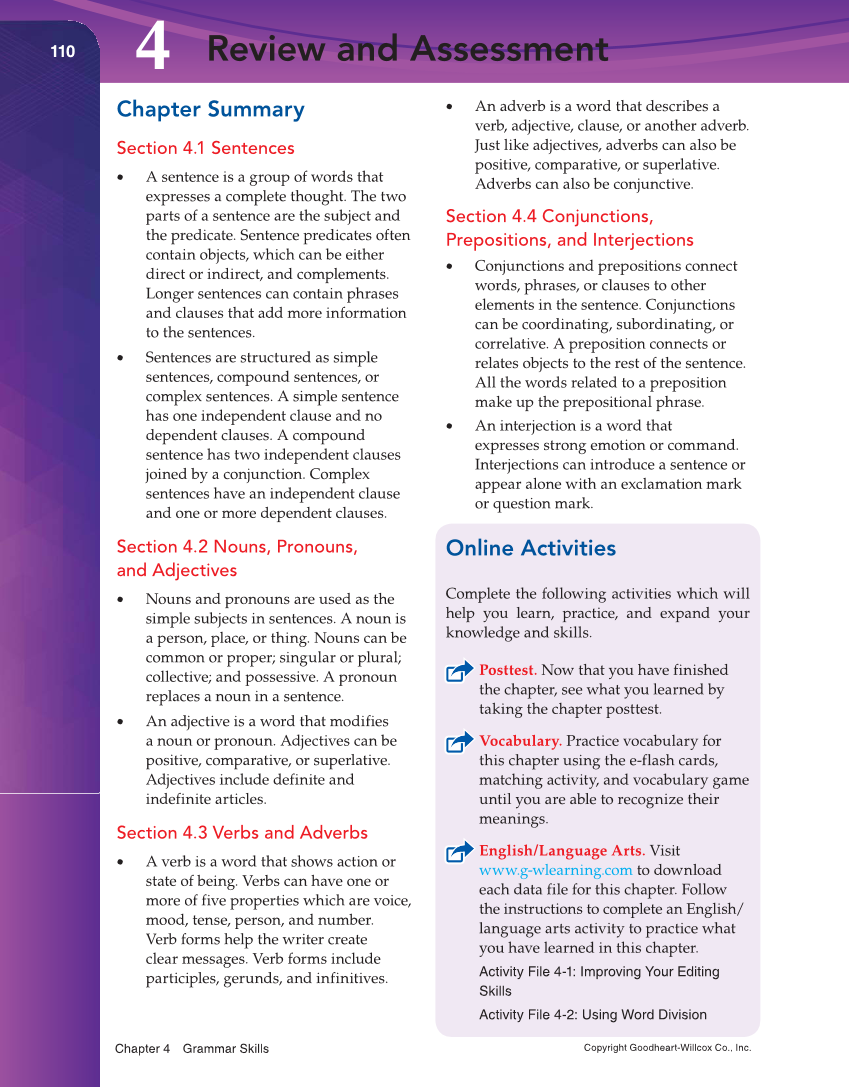Copyright Goodheart-Willcox Co., Inc. Chapter 4 Grammar Skills 110 Review and Assessment 4 Chapter Summary Section 4.1 Sentences • A sentence is a group of words that expresses a complete thought. The two parts of a sentence are the subject and the predicate. Sentence predicates often contain objects, which can be either direct or indirect, and complements. Longer sentences can contain phrases and clauses that add more information to the sentences. • Sentences are structured as simple sentences, compound sentences, or complex sentences. A simple sentence has one independent clause and no dependent clauses. A compound sentence has two independent clauses joined by a conjunction. Complex sentences have an independent clause and one or more dependent clauses. Section 4.2 Nouns, Pronouns, and Adjectives • Nouns and pronouns are used as the simple subjects in sentences. A noun is a person, place, or thing. Nouns can be common or proper singular or plural collective and possessive. A pronoun replaces a noun in a sentence. • An adjective is a word that modifies a noun or pronoun. Adjectives can be positive, comparative, or superlative. Adjectives include definite and indefinite articles. Section 4.3 Verbs and Adverbs • A verb is a word that shows action or state of being. Verbs can have one or more of five properties which are voice, mood, tense, person, and number. Verb forms help the writer create clear messages. Verb forms include participles, gerunds, and infinitives. • An adverb is a word that describes a verb, adjective, clause, or another adverb. Just like adjectives, adverbs can also be positive, comparative, or superlative. Adverbs can also be conjunctive. Section 4.4 Conjunctions, Prepositions, and Interjections • Conjunctions and prepositions connect words, phrases, or clauses to other elements in the sentence. Conjunctions can be coordinating, subordinating, or correlative. A preposition connects or relates objects to the rest of the sentence. All the words related to a preposition make up the prepositional phrase. • An interjection is a word that expresses strong emotion or command. Interjections can introduce a sentence or appear alone with an exclamation mark or question mark. Online Activities Complete the following activities which will help you learn, practice, and expand your knowledge and skills. Posttest. Now that you have finished the chapter, see what you learned by taking the chapter posttest. Vocabulary. Practice vocabulary for this chapter using the e-flash cards, matching activity, and vocabulary game until you are able to recognize their meanings. English/Language Arts. Visit www.g-wlearning.com to download each data file for this chapter. Follow the instructions to complete an English/ language arts activity to practice what you have learned in this chapter. Activity File 4-1: Improving Your Editing Skills Activity File 4-2: Using Word Division
